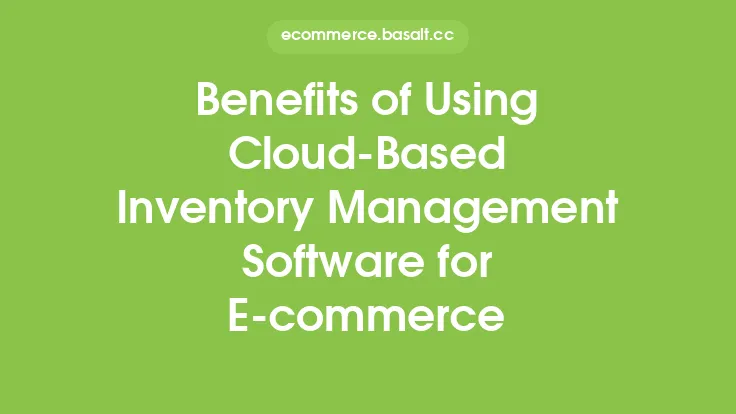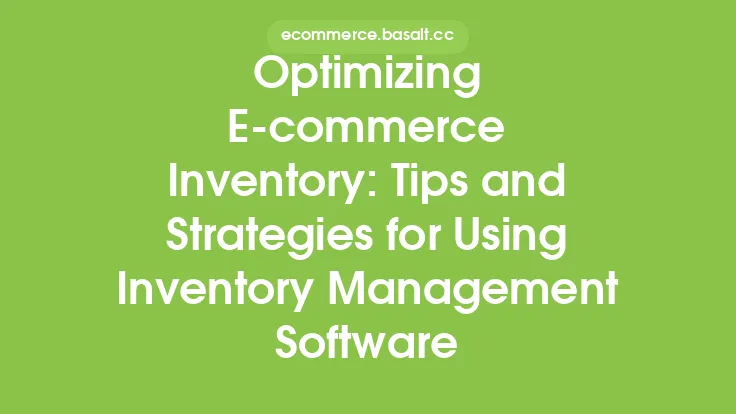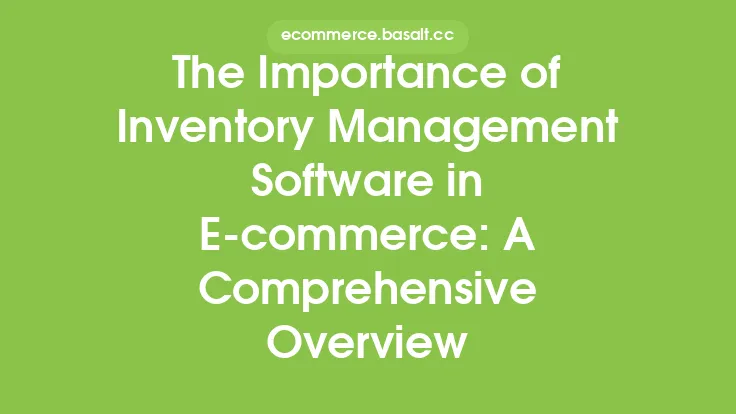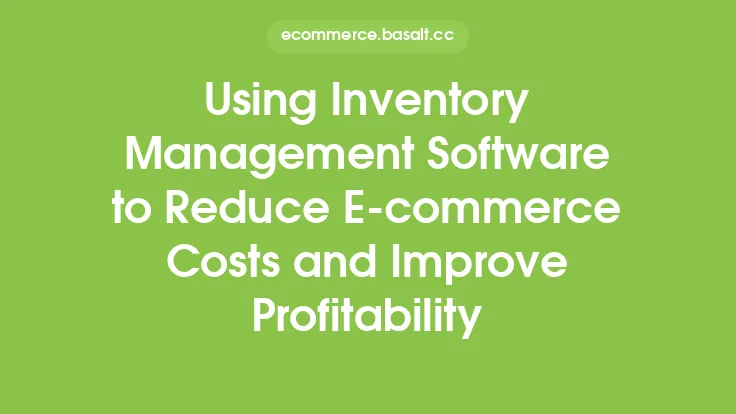In the world of e-commerce, managing inventory effectively is crucial for the success and sustainability of online businesses. As the e-commerce industry continues to grow and evolve, the need for efficient inventory management has become more pressing than ever. One of the most effective ways to achieve this is by utilizing inventory management software. This type of software is designed to help e-commerce businesses streamline their inventory management processes, making it easier to track, manage, and optimize stock levels.
What is Inventory Management Software?
Inventory management software is a digital tool that enables e-commerce businesses to monitor and control their inventory levels in real-time. It provides a centralized platform for tracking stock quantities, monitoring product movements, and automating various inventory-related tasks. With inventory management software, businesses can easily manage their inventory across multiple sales channels, warehouses, and locations. This software can be integrated with other e-commerce tools and platforms, such as online marketplaces, shopping carts, and accounting systems, to provide a seamless and efficient inventory management experience.
Key Features of Inventory Management Software
Inventory management software typically includes a range of features that help e-commerce businesses manage their inventory more effectively. Some of the key features of this software include:
- Real-time inventory tracking: This feature allows businesses to monitor their inventory levels in real-time, enabling them to make informed decisions about stock replenishment and product availability.
- Automated inventory updates: Inventory management software can automatically update inventory levels when products are sold, received, or transferred, reducing the risk of human error and inventory discrepancies.
- Low-stock alerts: This feature sends notifications to businesses when inventory levels fall below a certain threshold, enabling them to replenish stock and avoid stockouts.
- Inventory reporting and analytics: Inventory management software provides detailed reports and analytics on inventory levels, product movements, and sales trends, helping businesses to optimize their inventory management strategies.
- Multi-channel support: This feature enables businesses to manage their inventory across multiple sales channels, including online marketplaces, social media, and physical stores.
Benefits of Using Inventory Management Software
The benefits of using inventory management software are numerous and significant. Some of the most notable advantages of this software include:
- Improved inventory accuracy: Inventory management software helps businesses to maintain accurate inventory levels, reducing the risk of stockouts, overstocking, and inventory discrepancies.
- Increased efficiency: Automating inventory-related tasks and providing real-time inventory tracking enables businesses to streamline their inventory management processes, freeing up time and resources for other activities.
- Enhanced customer satisfaction: By ensuring that products are available when customers need them, inventory management software helps businesses to improve customer satisfaction and loyalty.
- Reduced costs: Inventory management software can help businesses to reduce their inventory costs by minimizing waste, optimizing stock levels, and improving supply chain efficiency.
- Scalability: Inventory management software can grow with businesses, providing a scalable solution for managing inventory as the business expands.
Choosing the Right Inventory Management Software
With so many inventory management software options available, choosing the right one can be a daunting task. When selecting an inventory management software, businesses should consider several factors, including:
- Ease of use: The software should be user-friendly and easy to navigate, even for those without extensive technical expertise.
- Integration: The software should be able to integrate with other e-commerce tools and platforms, such as online marketplaces and shopping carts.
- Customization: The software should be customizable to meet the specific needs of the business, including support for multiple sales channels and warehouses.
- Scalability: The software should be able to grow with the business, providing a scalable solution for managing inventory as the business expands.
- Support: The software provider should offer reliable support and training to help businesses get the most out of the software.
Implementing Inventory Management Software
Implementing inventory management software requires careful planning and execution. Businesses should start by assessing their current inventory management processes and identifying areas for improvement. They should then select an inventory management software that meets their needs and provides the necessary features and support. Once the software is implemented, businesses should provide training to their staff and monitor the software's performance to ensure that it is meeting their expectations.
Best Practices for Using Inventory Management Software
To get the most out of inventory management software, businesses should follow best practices, including:
- Regularly updating inventory levels and product information
- Monitoring inventory reports and analytics to optimize inventory management strategies
- Setting up low-stock alerts and automated inventory updates
- Integrating the software with other e-commerce tools and platforms
- Providing training to staff on how to use the software effectively
- Continuously reviewing and improving inventory management processes to ensure that they are aligned with business goals and objectives.
Conclusion
Inventory management software is a powerful tool for e-commerce businesses, providing a range of benefits that can help to improve inventory accuracy, increase efficiency, and reduce costs. By choosing the right software and following best practices, businesses can streamline their inventory management processes, improve customer satisfaction, and drive business growth. As the e-commerce industry continues to evolve, the importance of effective inventory management will only continue to grow, making inventory management software an essential tool for businesses that want to stay ahead of the competition.





